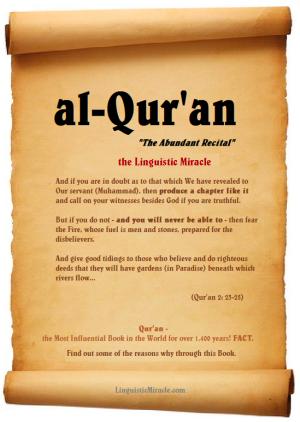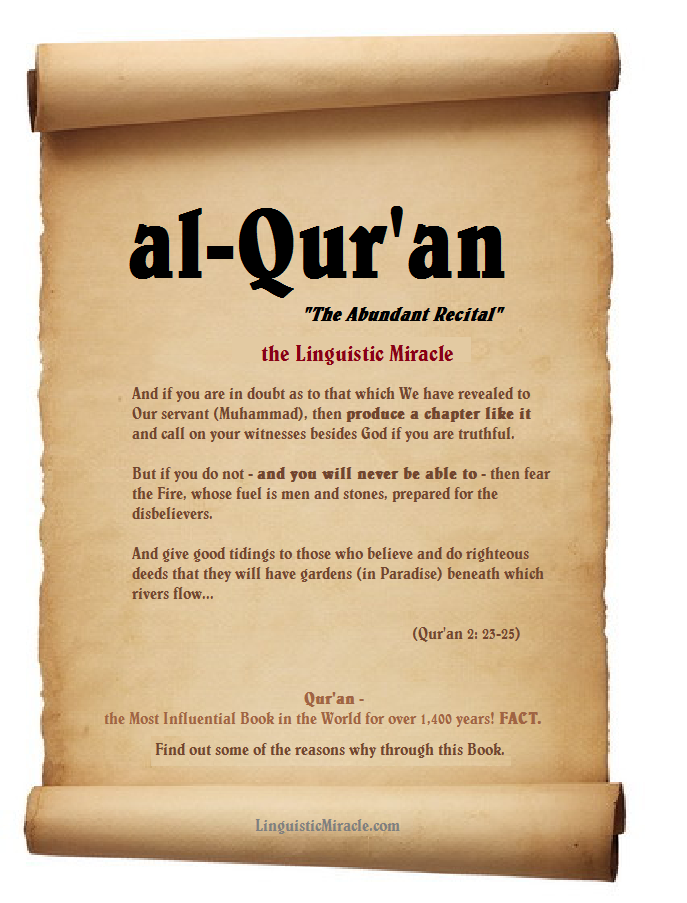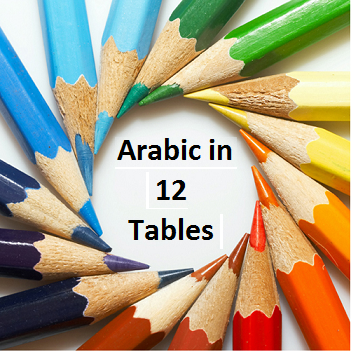السلام عليكم ورحمة الله وبركاته
an Overview of: Qur’an – the Linguistic Miracle Book –
by MuslimsAndTheWorld.com

..gives us an overview of their observations of the book;
The Linguistic Miracle of the Quran

The Quran is widely recognised as a miraculous book, for the unique style and presentation of the arabic language. As muslims worldwide know, the words and surahs contained in the Quran can only have come from Allah. Unlike other religious texts, the Quran famously issues a challenge to all mankind to try and produce even one Surah just like it. To date, nobody has been able to meet the challenge, even though many have tried.
To a native English speaker, this challenge sounds like it can easily be met, especially if they have read an English translation of the Quran. But the arabic language is so unique and powerful, that only after they study and learn it will they realise the great difficulty (and impossibility) of ever producing a surah which can rival that of those contained in the Quran.
The team at
Linguistic Miracle have produced an excellent document which goes into great detail explaining how the Quran is a true linguistic miracle. It covers the arabic language, the Quran, and also the aforementioned challenge contained in the Quran. You can download the book in either pdf or word format
directly from their website, and they also have available coloured charts to help you learn to understand arabic.
The document goes into a high level of detail, and it must be mentioned that having even a small knowledge of the arabic language will be a great advantage in understanding all the concepts they present. However, if you do not know any arabic, there will still be sections which will provide you with valuable knowledge of the Quran and arabic language. You will learn the conciseness of the language, and the wide range of amazing literary effects the language has had the potential of producing, as well as finding out how the pure root definitions, placement of words, and the intertwining of passages contributes to the special nature of the Quran.
The non-arabic speaker will be able to develop a greater appreciation of the Quranic text, as it is explained how the arabic words are presented to involve the use of sounds when recited, which adds dramatic effects for the listener, and can make it seem like they are watching a movie instead of reading or listening to a book. The effects are accurately explained by Arthur J. Arberry, who exclaimed
“Whenever I hear the Quran chanted, it is as though I am listening to Music, – words are recited to give meaning ike rain splashing and noises underneath the flowing melody there is sounding… insistent beat of a drum, it is like the beating of my heart.”
The final section of this important presentation covers the challenge issued by Allah to produce a surah like those in the Quran. Firstly it provides an outline for what the potential challenger is expected to produce, and secondly gives examples of those who have attempted the challenge, and provides an in-depth evaluation of their work and why they failed in the task.
We highly recommend that all muslims take a look at the Linguistic Miracle presentation, as they are sure to gain even a small amount of beneficial knowledge from it. To conclude, we will reproduce a list of what you can expect to learn from their sections on arabic and the Quran, and finish that with an inspiring quote from ibn Kathir, which provides a glimpse of what you are about to learn.
ARABIC
Classical Arabic is a concise language and can express alot of detail through its accurate, descriptive and rich triliteral root vocabulary.
Arabic etymology allows one to break down triliteral words to find their original etymological meaning. This allows one to understand Arabic vocabulary thoroughly and well at an extreme level.
The letters in Arabic all have a distinct sound which will have an impact on the meaning of the word. I.e. A thick sounding letter or word will carry a thick and deep meaning. A lightly pronounced letter sound will carry a light meaning. I.e. the Letter ‘Shiin’ has a dispersing sound effect, and that’s exactly what it etymologically means. Words which sound similar yet have a slight change in one letter might imply a different shade in meaning. I.e. NaD-H = Flowing water, NaD-kh = Gushing water.
3 letter words have near Synonyms with different shades of related meanings. Sometimes if these 3 letters are shifted in order – the meanings of the new word may be related. Antonyms will also allow one to appreciate the full meaning of a word because ‘words are known by their opposites’.
Words made of more than 4 letters + are often a fusion of 2 or more words (their meanings merged).
Some words are repeated twice to enhance a repeated effect. I.e. Waswasa = repeated whispering. This is often done for emphasis.
Different means of Eloquence are used to emphasise something in Arabic rhetoric. This might be done through shifting the word order in a sentence, or placing the name of an object closer to another intended object – depicting beautiful imagery of closeness or exclusivity of an object through eloquent speech.
Classical Arabic Poetry has similar to visual movie effects, and is portrayed through; metaphors, imagery, word-play and other literary devices in the most awesome of ways.
THE QURAN
The Qur’an when heard has an ecstatic, almost hypnotic and overwhelming of emotion effect to those who understand it, and even to those who don’t! to the extent that the antagonists who heard it from the mouth of Prophet Muhammad (peace be upon) accused it of being magic, due to its influence and power on the people when they heard it.
The Qur’an is unique in its layout, it defines its own structure as; Ayah, Surah, Qur’aan, giving the Qur’an a structural uniqueness in comparison to other texts.
Even at a literary level – it does not contain exaggerations or unnecessary words like poetry may. Rather it does the exact opposite of accurately choosing the best and most suited words which will describe in the most detail with the fewest of words.
The Qur’an contains meaningful, reflective, beneficial, practical and unmatched literary gems in Every Ayah, in comparison to poetry which may contain only a handful of literary gems in the entire poem.
The Qur’an contains linguistic Scientific marvels which describe modern science embryology in extreme detail and accuracy.
The Qur’an being the mother book of Arabic grammar has provided new levels of advancement in the Arabic language which were not found prior to it in any other language. Examples include; Maqaam – whereby one would use different parts of a book to gain contextual understanding of the overall picture. Tammam Hassan points out that when scholars of balagha [in Arabic rhetoric] recognized the concept of maqam (contextualisation), they were one thousand years ahead of their time. (in comparison to other languages of the world.)
The Qur’an also achieved an all-rounder success in using or introducing all the tools used for a piece of literature to have a powerful effect on all audiences (the experts of language and non-experts alike.)
The Qur’an uses; Sounds, Visuals, Movie-effects, word-play, human psychology, and rhetoric in the strongest of forms to target and influence the deep inner psyche of the listener.
We have seen an outline of how we can extract gems from the Qur’an ourselves.
Whoever reads through the Qur’an will realize that it contains various levels of superiority through both the apparent and hidden meanings that it mentions… So the expressions in the Qur’an are perfect and its meanings are explained. Further, every word and meaning in the Qur’an is eloquent and cannot be surpassed…
The Qur’an is true, just and full of guidance. It does not contain exaggerations, lies or falsehood, unlike Arabic and other types of poems that contained lies. Sometimes, one would find a long poem that mainly contains descriptions of women, horses or alcohol. Or, the poem might contain praise or the description of a certain person, horse, camel, war, incident, fear, lion, or other types of items and objects. Such praise or descriptions do not bring any benefit, except shed light on the poet’s ability to clearly and eloquently describe such items. Yet, one will only be able to find one or two sentences in many long poems that elaborate on the main theme of the poem, while the rest of the poem contains insignificant descriptions and repetitions.
As for the Qur’an, it is entirely eloquent in the most perfect manner, as those who have knowledge in such matters and understand Arabic methods of speech and expressions concur. When one reads through the stories in the Qur’an, he will find them fruitful, whether they were in extended or short forms, repeated or not. The more these stories are repeated, the more fruitful and beautiful they become. The Qur’an does not become old when one repeats reciting it, nor do the scholars ever get bored with it.
(Extract from: Tafsir ibn Kathir – Surah al Baqarah 2:24)




